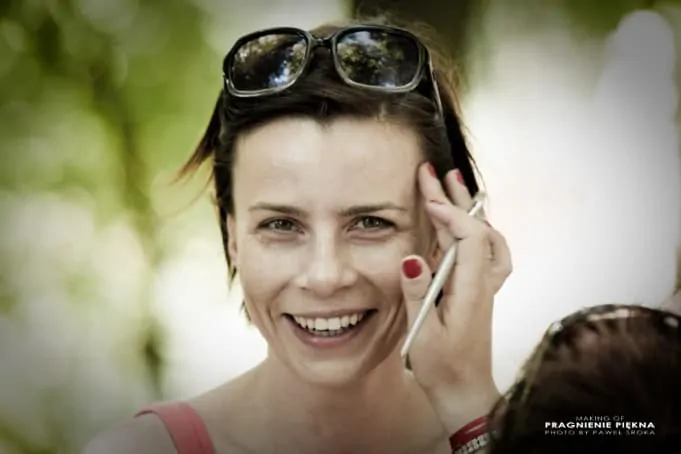It’s a documentary, but it could be a horror film.
Desire for Beauty begins with a young, attractive Polish woman getting drawn up by a surgeon for breast implants. She stands naked, red dash marks across her upper torso. She smiles nervously (while a cadre of cameramen film her every move). The doctor asks her if this is the size she wants. Yes, she responds. Later, her friend questions the decision, noting her pretty looks, and that her smaller chest enables her to gracefully wear retro dresses. 27-year old Maria sees no other way: “When you break a tooth you have it fixed.” (this may not exactly worded as this documentary is in Polish, with English sub-titles).
“We think, that nothing good is going to happen in our lives if we are not beautiful.”
Things That Mirrors Don’t Show
The documentary follows four people — three women, one man — who undergo the knife. We learn about their lives, their motivations. Aging, of course, is one of our biggest collective fears. For women, I think the aging process is of particular concern — sadly. Here in Silicon Valley, for instance, you won’t see many women over 40, at least those in leadership positions at major tech companies, with grey hair. Tech and start-ups are a young person’s game. Men, though, seem to get a pass. How often have we seen the ideal image of a technology executive painted as a middle-aged man with a coif of grey hair, and well-pressed suit? Too often I suspect; check your stock photo supplier of choice for ample evidence.

Fortunately Desire for Beauty doesn’t go for shock value, like so many TV reality shows that exploit women who in turn are exploiting themselves. Rather, there’s a welcome grace in director Miguel Gaudêncio’s touch. Yes, there is a certain voyeurism. That’s unavoidable, as we’re following the lives of four people across several months, and even years. Gaudêncio, who cut his teeth making music videos (having made 200 by age of 30), captures remarkable beauty and light in everyday moments — a conversation on a park bench, a train traveling across the countryside, a childhood flashback.
There are three incomprehensible mysteries in the world: Beauty, Justice, and Truth.
Of course, the subjects in this film are not just concerned about aging.
Maria’s dream is one of beauty. In her mind, her breasts are too small. She’ll feel better if they’re bigger. And, as is often the case, it’s a mental thing — likely caused by so many Photoshopped magazine covers, and the concept of beauty sold to us over decades/centuries of marketing. I look at her in this film, and see someone virtually perfect. Don’t change a thing! But the train has left the station. Interestingly, America gets a particularly bad rap when it comes to beautification culture, yet here, in this documentary shot in Poland, we see the same fears, rationalizations, and dreams. Turns out, being human is a global phenomena.
Indeed, occasional montages feel like horror movies. In one a young girl is bullied — “Witch!” — as she walks along a street. Quick editing shows her later looking into a mirror disgusted with her looks, accompanied by a Psycho-like score.
Fortunately, the filmmaker’s intent here appears to be less concerned to do with the blood-soaked images of the surgery itself then the inner monologue and psyche of those attempting to find peace with their looks and even their place in the world. The viewpoint alone lifts the material far beyond average.
I’m trying to fight inner ugliness.
One person suggests that a positive attitude would be a preferable first step to addressing phobias related to one’s looks. Apparently, the conversation that begun in the film extended beyond its release and included renowned members of the Polish social scene including experts in the fields of psychology and fashion. Given the advent of social media, and the despicable cyber-bullying trend it seems this conversation is more relevant (and global) than ever.
Desire for Beauty doesn’t necessarily tread new territory (the inevitable unveiling shots and an epilog), nor does it need to. What it achieves is to add a thoughtful, often poignant, and gorgeously cinematic window into some of our greatest hopes and fears. Though we may liken horror to bloody visuals and scream queens, it’s often what’s inside our minds that is far scarier. But here Miguel Gaudêncio skillfully nurses the tenderness of the human spirit and our eternal desires. Unlike reality television, you come away from this one inspired, ever hopeful.
Look for Desire for Beauty on: Hulu (US only), Amazon Prime, Vimeo on Demand, Indieflix, Indiereign, Cinecliq, and Reelhouse.



